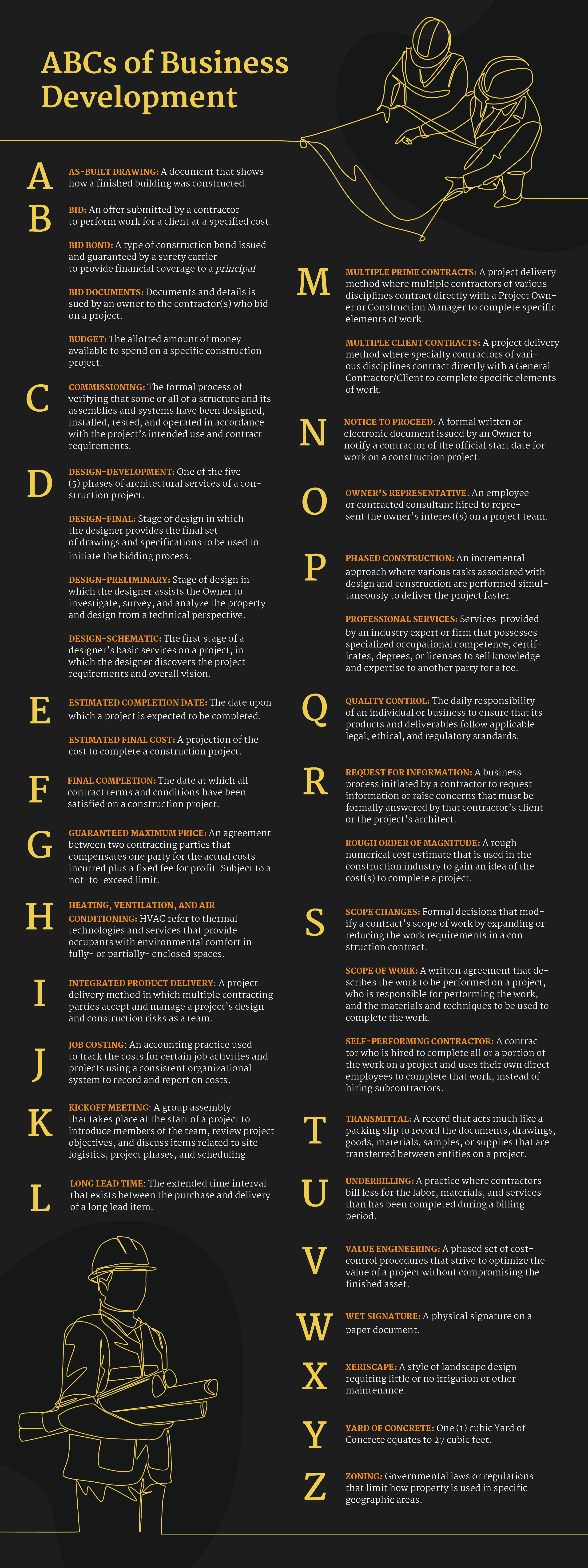Our Business Development TEKTOK focuses on terminology that is helpful when talking with technical professionals, owners, and clients about a project.Learn some of the ABCs of Technical Jargon that will elevate your understanding of what you are “selling.”

As-Built Drawing
An As-Built Drawing is a document that shows how a finished product was installed. When performing new construction or renovation projects, contractors are required to submit detailed as-built drawings that include all changes to ensure that an accurate and up-to-date drawing of the completed work exists. It is similar to a Record Drawing.
Bid
A Bid is a firm offer submitted by a contractor to perform work for a client at a specified cost and in accordance with the terms and conditions defined in a proposal for a construction project. If a bid is accepted by the client, the contractor is expected to honor the commitment and deliver the work.
Bid Bond
A Bid Bond is a type of construction bond issued and guaranteed by a surety carrier to provide financial coverage to a principal. In construction, a bid bond is often purchased by a contractor hired to perform the work for an Owner to act as an insurance policy for compensating the Owner if the contractor fails to honor the terms of the awarded bid.
Bid Documents
Bid Documents include the required agreements, bid forms, charts, conditions, proposed contracts, drawings, plans, instructions, invitations, specifications, and other written details issued by an owner to the contractor(s) who bid on a project.
Budget
A Budget is the allotted amount of money available to spend on a specific construction project. Budgets track a project's anticipated costs and expenses throughout the construction process.
Commissioning
Commissioning (Cx) is the formal process of verifying that some or all of a structure and its assemblies and systems (such as heating, ventilation, and air conditioning (HVAC), elevator control, fire suppression, and more) have been designed, installed, tested, and operated in accordance with the project's intended use and contract requirements. For new construction, the process is called Building Commissioning (Cx). For existing buildings and structures, Retrocommissioning and Recommissioning are similar processes for deeming a structure ready for service.
Design-Development
Design-Development (DD) refers to one of the five (5) phases of architectural services of a construction project where the Architect uses the Schematic Design (SD) to produce the project's initial Construction Documents (CDs).
Design-Final
The Design-Final stage (also called Final Design) occurs after the preliminary stage. In this stage, the designer provides the final set of drawings and specifications to be used to initiate the bidding process. After the final design is approved by the Owner, the bidding and procurement stage of the project begins.
Design-Preliminary
The Design-Preliminary stage (also called Preliminary Design and Design Development) occurs after the Design-Schematic stage (the stage that decides the final concept). In this stage, a designer assists the Owner to investigate, survey, and analyze the property and design from a technical perspective to determine the architectural, mechanical, and structural components of the design.
Design-Schematic
The term Design-Schematic (also called Schematic Design) refers to the first stage of a designer's basic services on a project. During this stage, the designer discovers the project requirements and overall vision and then presents a variety of schematic designs (such as drawings, sketches, and so on) to settle on the final schematic design.
Estimated Completion Date
The Estimated Completion Date is the date upon which a project is expected to be completed in accordance with the plans and specifications for the construction project.
Estimated Final Cost
The Estimate Final Cost (EFC) is a projection of the cost to complete a construction project that is developed from a project's anticipated costs.
Final Completion
The term Final Completion refers to the point in time or date at which all contract terms and conditions have been satisfied on a construction project.
Guaranteed Maximum Price
A Guaranteed Maximum Price (GMP or GMAX) contract is an agreement between two contracting parties that compensates one party for the actual costs incurred plus a fixed fee for profit that is subject to a not-to-exceed limit.
Heating, Ventilation, and Air Conditioning
Heating, Ventilation, and Air Conditioning (HVAC) refer to thermal technologies and services that provide occupants with environmental comfort in fully- or partially- enclosed spaces, such as a building or a vehicle.
Integrated Product Delivery
Integrated Product Delivery (IPD) is a project delivery method, similar to a Guaranteed Maximum Price (GMP) contract, in which multiple contracting parties accept and manage a project's design and construction risks as a team. In the IPD model, an Owner, Designer, and General Contractor (GC) executes a single, multi-party contract that shares the financial risks and splits the team's profits based on measured outcomes.
Job Costing
Job Costing is an accounting practice in the construction industry used to track the costs for certain job activities and projects using a consistent organizational system to record and report on costs.
Kickoff Meeting
A Kickoff Meeting refers to a group assembly that takes place at the start of a project to introduce members of the project team, review project objectives, as well as to review and discuss items related to site logistics, project phases, and scheduling.
Long Lead Time
A Long Lead Time refers to the extended time interval that exists between the purchase and delivery of a long lead item. In construction, it can refer to an extended period of time between order placement and delivery due to a manufacturing process or transportation requirement. It can also refer to an extended time interval between project initiation and the project start date due to a contractor's availability, a holiday schedule, inclement weather, and other variables.
Multiple Prime Contracts
The phrase Multiple Prime Contracts refers to a project delivery method where multiple contractors of various disciplines (for example, electrical, mechanical, plumbing, and so on) contract directly with a Project Owner or the Owner's Construction Manager (CM) to complete specific elements of work.
Multiple Client Contracts
The phrase Multiple Client Contracts refers to a project delivery method where specialty contractors of various disciplines (for example, electrical, mechanical, plumbing, and so on) contract directly with a General Contract/Client to complete specific elements of work.
Notice to Proceed
A Notice to Proceed (NTP) is a formal written or electronic document issued by an Owner (or an Owner's Construction Manager (CM)) to notify a contractor of the contract's official start date for work on a construction project.
Owner's Representative
An Owner's Representative is an employee or contracted consultant hired to represent the owner's interest(s) on a project team.
Phased Construction
Phased Construction refers to an incremental approach where various tasks associated with the design phase and construction phase are performed simultaneously to deliver the project faster.
Professional Services
Professional Services are provided by an industry expert or firm that possesses specialized occupational competence, certificates, degrees, or licenses to sell knowledge and expertise to another party for a fee. In construction, Professional Services span a wide variety of disciplines such as design services, dispute resolution, general contracting, facilities management, financial management, project management, safety, sustainability, and more.
Quality Control
Quality Control (QC) refers to the daily responsibility of an individual or business to ensure that its products and deliverables follow applicable legal, ethical, and regulatory standards. It involves the continuous review, certification, evaluation, inspection, and testing of components, products, techniques, and participants.
Request for Information
In construction, the term Request for Information (RFI) refers to a business process initiated by a contractor (for example a general contractor, subcontractor, or supplier) to request information or raise concerns that must be formally answered by that contractor's client or the project's architect. The client or architect's answer can change the project's scope of work and may also require approval when it affects contract costs.
Rough Order of Magnitude
Rough Order of Magnitude (ROM) is a rough numerical cost estimate that is used in the construction industry to gain a rough idea of the cost(s) to complete a project. ROM estimates are typically provided by a knowledgeable, high-level expert during the initiation/beginning phases of a project when there is still a high level of uncertainty about the project. ROM estimates are understood to have a lower level of accuracy than a definitive/conclusive estimate.
Scope Changes
Scope Changes are formal decisions that modify a contract's scope of work by expanding or reducing the work requirements in a construction contract. A scope change is often associated with a change order.
Scope of Work
A Scope of Work (SOW) refers to a written agreement that describes the work to be performed on a project, who is responsible for performing the work, and the materials and techniques to be used to complete the work. It also defines the delivery method and payment schedule. It is sometimes called a Statement of Work (SOW).
Self-Performing Contractor
A Self-Performing Contractor is a contractor who is hired to complete all or a portion of the work on a project and uses their own direct employees to complete that work, instead of hiring subcontractors.
Transmittal
A Transmittal is a record that acts much like a packing slip to record the documents, drawings, goods, materials, samples, or supplies that are transferred between entities on a project.
Underbilling
Underbilling refers to a practice where contractors bill less for the labor, materials, and services than has been completed during a billing period.
Value Engineering
Value Engineering (VE) refers to a phased set of cost-control procedures that strive to optimize the value of a project by researching, evaluating, developing, and presenting lower-cost alternatives (for example, materials, solutions, and techniques) without compromising the function, performance, quality, or reliability of the finished asset.
Wet Signature
A Wet Signature refers to a physical signature on a paper document. It's a term that's often used to describe whether an authorized document was physically signed with a pen, as opposed to being authorized via an electronic/digital signature (i.e. e-signature).
Xeriscape
A style of landscape design requiring little or no irrigation or other maintenance, used in arid regions.
Yard of Concrete
One (1) cubic Yard of Concrete equates to 27 cubic feet.
Zoning
Zoning refers to governmental laws or regulations that limit how property is used in specific geographic areas.






